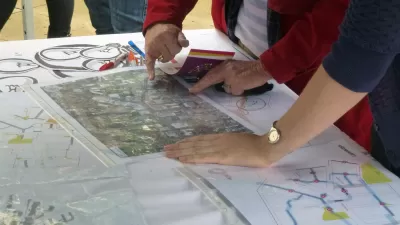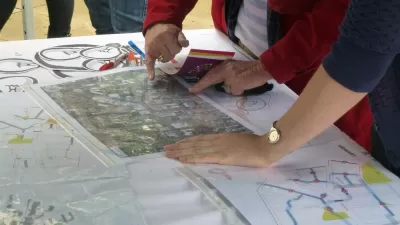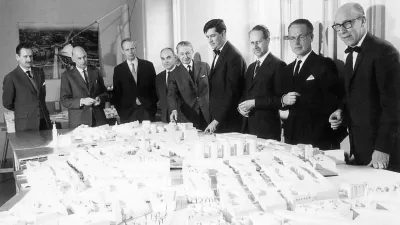Well known planning scholar and theorist Dr. Karen Christensen, from UC Berkeley, introduces her findings from a decade of interviews with exemplary planners in the San Francisco Bay Area.

Blog Post by Dr. Karen Christensen
My new article, "Both Process and Outcome Essential to Planning" (Open Access until May 30) brings the views of exemplary practicing planners to bear on a long-standing debate in planning theory. The debate concerns which should be most emphasized by planners: process or outcome. Process refers to the process the planner follows when planning, be it a rational, collaborative, or negotiating process. Outcome refers to the results when the planner has completed the planning (and implementing) process, for example a sustainable community. To answer this question, I used data collected in 119 interviews by graduate students in U.C. Berkeley's Planning & Institutions course, which I taught during the 1990s. As part of the course each student conducted the same structured interview with exemplary planners in the San Francisco Bay Area, meant to be role models.
The interviews revealed that consistent with communicative theorists’ claims more exemplary planners are facilitators than either technicians or activists. Moreover, the strategies most used—"build social capital" (e.g., networking) and "improve communication" (e.g., use an open process)—are particularly appropriate to consensus building.
At the same time, leading Bay Area practitioners understood planning as embedded in politics and shaped by institutions. For example, planners mentioned "intergovernmental resentments and power relations" and "direction from funding agencies." In explaining both their goals and their criteria of effectiveness planners showed themselves directed to outcomes.
Exemplary planners' strategies suit their roles and the political and organizational constraints they perceive, adopting strategies appropriate for a shared power world and asymmetric power relations. Thus, exemplary planners must take politics into account as they act as facilitators. However constrained they were, planners in the study believed they could be effective. One said "Stick to what you know to be important, bring your planning sense to that, and people will listen." On the other hand, the planners spoke about institutional constraints and uneven power relations. One said that the hardest lesson for her to learn was to listen to the politics. Exemplary planners accept political constraints as a factor to be taken into account, rather than a barrier to be removed.
Exemplary planners describe themselves as facilitators using communication and networking strategies in institutionally constrained practice settings of unequal power. Moreover, exemplary planners are goal directed. They use process and political skills to achieve valued outcomes.

These 10 years of interviews highlight that process-outcome is not necessarily a dichotomy, as different kinds of outcomes imply different kinds of processes. For example, economists might emphasize outcomes with highest benefit-cost ratios and equity planners might emphasize community organizing. In the Portland area, a collective movement tried to find ways to combine urbanization with safeguarding rural and natural areas. Values seem to shape the line between ends and means.
Open Access via SAGE Publications until May 30, 2015:
Christensen, Karen S. “Both Process and Outcome Essential to Planning.”Journal of Planning Education and Research (2015): 0739456X14566277.
Blog Post by Dr. Karen Christensen, Professor Emerita of City and Regional Planning: http://ced.berkeley.edu/ced/faculty-staff/karen-christensen.
You Can Follow @JPER7 on Twitter or on Facebook https://www.facebook.com/JPERPlanning.

Planetizen Federal Action Tracker
A weekly monitor of how Trump’s orders and actions are impacting planners and planning in America.

San Francisco's School District Spent $105M To Build Affordable Housing for Teachers — And That's Just the Beginning
SFUSD joins a growing list of school districts using their land holdings to address housing affordability challenges faced by their own employees.

The Tiny, Adorable $7,000 Car Turning Japan Onto EVs
The single seat Mibot charges from a regular plug as quickly as an iPad, and is about half the price of an average EV.

Seattle's Plan for Adopting Driverless Cars
Equity, safety, accessibility and affordability are front of mind as the city prepares for robotaxis and other autonomous vehicles.

As Trump Phases Out FEMA, Is It Time to Flee the Floodplains?
With less federal funding available for disaster relief efforts, the need to relocate at-risk communities is more urgent than ever.

With Protected Lanes, 460% More People Commute by Bike
For those needing more ammo, more data proving what we already knew is here.
Urban Design for Planners 1: Software Tools
This six-course series explores essential urban design concepts using open source software and equips planners with the tools they need to participate fully in the urban design process.
Planning for Universal Design
Learn the tools for implementing Universal Design in planning regulations.
Smith Gee Studio
City of Charlotte
City of Camden Redevelopment Agency
City of Astoria
Transportation Research & Education Center (TREC) at Portland State University
US High Speed Rail Association
City of Camden Redevelopment Agency
Municipality of Princeton (NJ)






























